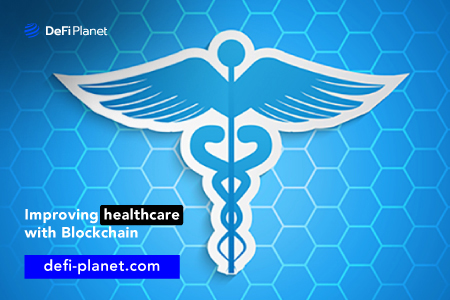Last updated on July 27th, 2023 at 04:14 am
The healthcare sector is plagued with discrepancies and inefficiencies, which aren’t limited to rural areas as popular discourse may have us believe. Developed communities also encounter these challenges.
The problems in the healthcare sector encompass more than just limited access to medical facilities; they also involve managing and safeguarding healthcare data privacy.
Beyond cryptocurrency, blockchain technology has demonstrated its versatility and holds the potential to address existing healthcare system issues.
While it may not directly cure illnesses, the application of blockchain tech in healthcare can significantly enhance the sector’s efficiency, impacting the lives of billions who depend on it.
The technology offers a compelling solution to privacy and security concerns, patient data management, and several other use cases directly affecting patients. Every stakeholder in the sector stands to benefit from its adoption.
This article explores the use of blockchain in healthcare and examines its potential to revolutionize the industry.
TL: DR
- The healthcare sector faces inefficiencies and data privacy issues, which blockchain technology can address.
- Blockchain can improve data management, supply chain tracking, and patient-centric care in healthcare.
- Blockchain offers solutions like affordable healthcare access, interoperable systems, secure data storage, and improved medical research.
- Real-world blockchain applications in healthcare include insurance settlement, patient records, medical staff verification, hospital cybersecurity, and supply chain transparency.
- Challenges to blockchain adoption in healthcare include cost, expertise, interoperability, and regulatory issues.
- The future of blockchain in healthcare depends on overcoming challenges and gaining industry support.
Blockchain In Healthcare
The integration of technology and healthcare has a rich history that continues to shape the industry today.
The introduction of computers in the 60s brought significant advancements and improvements to healthcare practices. These technological innovations have had a lasting impact on the field and continue to benefit humanity.
This historical precedent provides a solid foundation for exploring the potential application of modern technologies, such as blockchain, in the healthcare industry.
Blockchain technology offers a practical way to decentralize information. It takes data creation, storage, and transmission to a whole new level, surpassing what Web 2 tech has achieved so far. This makes it a perfect fit for the healthcare industry, with its emphasis on data validity and security.
One notable application of blockchain in healthcare is the creation and maintenance of a unified healthcare record.
Imagine having a comprehensive and indestructible document that stores your medical history since birth. This would eliminate concerns when visiting a new doctor, as they can readily access your medical background with trust and the option for independent verification.
Whether you move to a new city or switch healthcare providers, your data will remain easily accessible yet highly secure.
The potential of blockchain in healthcare extends well beyond efficient data management.
Compared to traditional systems, blockchain can significantly improve efficiency by enabling real-time data tracking and ensuring the validity of healthcare products throughout the supply chain.
From manufacturing to shipping across different locations, blockchain addresses existing challenges, such as counterfeit products and the lack of accountability.
In essence, blockchain technology in healthcare promotes a patient-centric approach, prioritizing the protection and well-being of patients.
The possibilities of blockchain in healthcare are vast and only limited by our willingness to explore creative solutions.
Why Does Healthcare Need Blockchain Technology?

Access to Inexpensive Healthcare Services
Blockchain technology solves rising healthcare costs and inadequate services, particularly in underdeveloped nations. The transparency of public blockchains can be leveraged to ensure that high-quality healthcare reaches a wider audience without the need for intermediaries.
With over half of the global population living on less than $6 per person per day, a staggering number of people receive substandard healthcare.
Blockchain healthcare startups like XRP Healthcare aim to eliminate middlemen and offer direct and affordable access to quality healthcare, even in rural areas.
Interoperability of the Healthcare Systems
The use of blockchain in healthcare can serve as a unifying solution for the fragmented healthcare system, which currently lacks interoperability.
The absence of seamless data sharing across various healthcare divisions often leads to redundant medical tests and unnecessary expenses.
By establishing interoperable networks, blockchain enables different healthcare networks to work in parallel, facilitating the seamless sharing and accessing of data within their respective networks.
This approach promotes efficiency and reduces duplication of tests and costs for patients when interacting with multiple healthcare providers.
Securing Patients’ Data
A basic feature of blockchain technology is immutability, which refers to the difficulty of changing the data stored on the blockchain. In a decentralized system like a public blockchain, an attacker would need to control at least 51% of the network to alter the data, which is highly unlikely due to blockchain’s decentralization.
This inherent immutability makes blockchain an efficient technology for securely storing sensitive data, such as patient healthcare history, in a tamper-proof environment. Once patient data is recorded on the blockchain, it becomes challenging to modify.
This feature has the potential to play a crucial role in reducing the over 2 million deaths caused by medical errors, as more consistent and accurate data can contribute to an improved healthcare system.
Improved Healthcare Research
Applying blockchain in healthcare facilitates valuable healthcare research by balancing patient privacy and data accessibility. By leveraging concepts like Zero-Knowledge proofs (ZKPs), patient data can be accessed without compromising personal information.
This approach enables the availability of sufficient data for high-quality research to improve the healthcare system while effectively safeguarding patient data.
Consistent Data Availability
Centralized data storage systems are vulnerable to hacks and downtime. In contrast, blockchain can continue functioning even if multiple nodes go offline, making it highly robust.
This feature is especially valuable in critical sectors like healthcare, where data availability and sustainability are essential requirements. Blockchain’s ability to ensure uninterrupted access to data makes it an appealing choice for the healthcare sector.
Patient Empowerment
Blockchain technology allows patients to have greater control over their healthcare data. Patients can actively access and manage their medical records, give consent for data sharing, and participate in research studies through decentralized applications (dApps) built on blockchain.
This active involvement in their own healthcare data fosters trust and collaboration between patients and healthcare providers, ultimately leading to more personalized and patient-centric care.
Real-World Use Cases of Blockchain in Healthcare
Let’s explore some of the existing blockchain-in-healthcare use cases.

Chronicled: Insurance Settlement through Smart Contracts

Despite paying substantial amounts of money for health insurance, lots of people often encounter challenges when relying on their insurance for assistance. These challenges stem from inefficient data management systems and a lack of interoperability, making it difficult to access necessary data for insurance purposes.
Smart contracts provide a solution to streamline claims settlement and reduce disputes. Smart contracts encode the conditions of the agreement and automatically initiate settlements when those conditions are met. The implementation of smart contracts facilitates collaboration among various stakeholders in the medical field, enhancing overall efficiency.
Chronicled, a blockchain-based company, is an example of a company leveraging this technology to improve insurance settlement processes in the healthcare industry.
BurstIQ: Accessible and Innovative Health Record System

The process of transferring patients from one hospital to another is always challenging because of the lack of interconnectedness between centralized data storage systems among healthcare facilities.
It becomes even more complicated because of the bureaucratic hurdles involved. Transferring patient health records is often a painfully laborious and time-consuming process taking weeks or even months.
In an industry where timely decisions are critical, the combination of bureaucracy and centralized data storage systems has dire consequences. Blockchain technology in healthcare provides a solution by enabling patient-centric electronic health records. BurstIQ, as an example, utilizes blockchain technology to achieve this objective.
ProCredEx: Quality Assurance for Medical Personnel

In the medical field, ensuring the employment of qualified personnel is essential, particularly when verifying credentials related to experience and training. A blockchain-based tracking system simplifies the process of verifying and hiring the right medical staff.
This system streamlines hiring procedures, reduces costs, and promotes transparency throughout the process. ProCredEx is an example of a platform that provides this service.
Guardtime: Improving the Cybersecurity of Hospitals

Hospitals, being custodians of valuable patient data, are frequent targets for hackers. Opting for a paper-based storage system is inefficient and vulnerable to risks like fires that can destroy records.
A more efficient alternative for secure record-keeping is provided by blockchain technology because of its immutability. Companies like Guardtime are integrating blockchain into hospital security architectures so as to enhance data security and safeguard sensitive information.
MediLedger: Adding Transparency to Supply Chain

Medical care demands high-quality products; however, tracking and verifying the authenticity of medical goods pose significant challenges.
Unscrupulous actors exploit loopholes in the system, introducing counterfeit products that jeopardize human life. To address this, medical practitioners and patients alike require a system that enables easy tracking of the supply chain.
Blockchain technology offers a solution by allowing different participants to access data from manufacturers to the delivery system. Its transparency facilitates the identification of genuine sources. MediLedger is a blockchain healthcare company that currently offers this solution to enhance supply chain integrity in the healthcare sector.
The Challenges of Incorporating Blockchain Technology into Healthcare
You might be curious why, despite its potential to revolutionize healthcare, blockchain technology hasn’t seen widespread adoption. Well, let’s delve into some of the reasons behind this.
Cost
Blockchain does have the potential to eliminate costly centralized components in healthcare services, but that doesn’t mean it comes cheap. Setting up a suitable environment for integrating blockchain technology can be expensive and complex. This complexity makes it challenging to implement across the already intricate and sensitive healthcare industry.
Expertise
Implementing blockchain effectively in healthcare requires a strong collaboration between the healthcare and blockchain sectors. This symbiotic relationship ensures a balance between the quality of research and the efficiency of solutions developed.
While the healthcare industry boasts abundant expertise, the blockchain sector is still relatively young. Finding professionals well-versed in both healthcare and blockchain is not easy, making it difficult to lead high-quality research focused on applying blockchain in healthcare.
Interoperability
Interoperability, or the ability of different systems to work together seamlessly, is crucial for any technology’s success. At present, the blockchain industry’s interoperability is not as developed as it needs to be for widespread adoption.
This puts blockchain at a disadvantage compared to traditional data management providers that offer better support for interoperability. Consequently, blockchain may not be an immediate solution to meet the evolving needs of industries like healthcare.
Regulation
The lack of clear regulations surrounding the use of blockchain in healthcare is a significant hindrance to its rapid adoption. Highly regulated sectors like healthcare require specific guidelines for practitioners to ensure compliance. Without these guidelines, blockchain adoption may face significant delays.
The response of regulatory bodies within the healthcare sector plays a vital role in determining the extent to which blockchain technology can be adopted across the industry.
Future Outlook of Blockchain Use in Healthcare
Given the current state of healthcare systems and the increasing demands placed upon them, blockchain technology has the potential to bring about transformative advancements.
While existing systems have already shown support for blockchain in healthcare through real-world use cases, it remains in its early stages of implementation. As this technology matures, we can expect it to play a more prominent role in various aspects of healthcare, offering a more efficient, secure, and patient-centred system.

Of course, the trajectory of blockchain in healthcare largely hinges on the definitions and regulations established by governmental and healthcare regulatory bodies, as well as the response from industry stakeholders.
There are some uncertainties surrounding its future utilization, primarily due to the limited availability of expertise and the complex regulatory landscape.
The paradox is that despite the initial high costs of establishing blockchain systems, they hold promise in making healthcare services more affordable in the long run.
The potential of blockchain technology in healthcare is vast, yet its realization depends on overcoming regulatory challenges and garnering support from the healthcare industry.
If you would like to read more articles like this, visit DeFi Planet and follow us on Twitter, LinkedIn, Facebook, Instagram, and CoinMarketCap Community.
“Take control of your crypto portfolio with MARKETS PRO, DeFi Planet’s suite of analytics tools.”





















